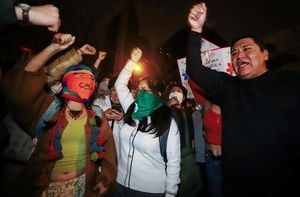On the turbulent frontlines of Israeli-Palestinian relations, the question of how to bring hostages home from Gaza has once again torn at the moral fabric of Israeli society. As of October 12, 2025, dozens of Israeli citizens—soldiers and civilians alike—remain in the grip of militant groups in Gaza, their fate intertwined with the demands for the release of some 2,000 Palestinian prisoners, many convicted of violent crimes. This latest round of hostage negotiations, unfolding in the wake of a devastating attack and amid mounting casualties on both sides, has reignited old wounds and forced Israelis to confront agonizing ethical dilemmas about justice, forgiveness, and the price of human life.
For Tal Hartuv, the debate is deeply personal. She bears a jagged scar on her chest, one of 18 wounds from a brutal 2010 stabbing outside Jerusalem that claimed the life of her friend, American tourist Kristine Luken. Next to the scar hangs a dog tag inscribed with the words, "Our heart is captive in Gaza," a symbol that has become a rallying cry for those supporting a ceasefire deal that would see Israeli hostages exchanged for Palestinian prisoners. As reported by the Associated Press, this phrase has resonated widely, capturing the mixture of hope and anguish that defines the current moment.
Hartuv’s turmoil was compounded when she learned—without any official notice from the Israeli government—that one of her assailants, Iyad Hassan Hussein Fatafta, would be among those released as part of the exchange. "It’s an excruciating choice," a family member of a hostage told beritasriwijaya.co.id, encapsulating the searing personal conflicts at the heart of the national debate. Hartuv’s story is not unique; across Israel, families of terror victims are wrestling with the knowledge that those responsible for past violence may soon walk free, even as they yearn for the safe return of loved ones held captive in Gaza.
The current crisis is rooted in the events of October 7, 2025, when Hamas militants launched a deadly attack that killed approximately 1,200 Israelis and resulted in the abduction of scores of hostages. The Israeli military response has been fierce, with over 67,000 Palestinian casualties reported, the majority of them women and children. As negotiations proceed, Hamas has agreed to release the remaining 48 Israeli hostages by the end of the week, in exchange for the release of around 2,000 Palestinian prisoners from Israeli jails. This deal, as reported by multiple outlets, includes individuals convicted of violent crimes—a fact that has deepened the sense of injustice for many Israeli families.
Israel’s history with prisoner exchanges is long and fraught. The most famous example remains the 2011 swap that saw Israeli soldier Gilad Shalit freed after five years in captivity in return for more than 1,000 Palestinian prisoners. That deal, like so many before and since, divided public opinion and raised fears that releasing militants could encourage further violence. According to a recent poll cited by beritasriwijaya.co.id, a majority of Israelis still support efforts to bring hostages home, even if it means making painful compromises. Yet, the scars of past exchanges linger, especially for those who have lost loved ones to terror attacks.
Yossi Zur, whose son was killed in a terror attack, has long campaigned against prisoner releases, haunted by the knowledge that Yahya Sinwar—once freed in a previous exchange—would later orchestrate another deadly assault on Israel. "It’s not going to be worth the fight this time," Zur admitted, as reported by beritasriwijaya.co.id, acknowledging the overwhelming scale of the current hostage crisis and the imperative to prioritize the lives of those still in captivity. His change of heart reflects a broader shift in Israeli society, where the sheer number of hostages and the intensity of public pressure have pushed many to accept the painful trade-offs inherent in such negotiations.
Not everyone agrees. Ron Kehrmann, whose daughter was also a victim of violence, remains adamant that releasing prisoners sends the wrong message. He argues, as reported by beritasriwijaya.co.id, that such exchanges undermine deterrence and risk perpetuating a cycle of violence. This tension—between the desire for justice and the hope for reconciliation—has exposed deep rifts within Israeli society, as families and policymakers grapple with the moral costs of their decisions.
The emotional toll on families is immense. For those whose loved ones were killed, the prospect of seeing their attackers released is a bitter pill, one that reopens old wounds and challenges their sense of justice. For the families of hostages, the agony of waiting, hoping, and fearing for their relatives’ safety overshadows all else. As Hartuv told AP, the dichotomy of emotion—joy for the return of hostages, sorrow for the release of those who inflicted pain—serves as a painful reminder of the complexities of reconciliation in the face of ongoing conflict.
The psychological impact on returning hostages cannot be understated. As noted by beritasriwijaya.co.id, survivors often suffer from long-term effects such as post-traumatic stress disorder (PTSD), anxiety, and depression. Comprehensive support systems are essential for their rehabilitation and reintegration into society, a challenge that Israeli authorities are only beginning to address in earnest.
International actors have played a significant role in mediating the current negotiations. The United States and European nations, alongside various humanitarian organizations, have worked behind the scenes to broker a deal, urging all parties to adhere to international laws governing the treatment of prisoners and hostages. Their involvement underscores the broader geopolitical stakes of the conflict, as any shift in the status quo could have ripple effects across the region.
Meanwhile, the Israeli media has kept the issue front and center, with extensive coverage fueling public debate and shaping the contours of the political response. Social media, too, has amplified voices on all sides, giving rise to grassroots movements both for and against the prisoner exchange. The phrase on Hartuv’s dog tag—"Our heart is captive in Gaza"—has become a potent symbol of solidarity, hope, and the enduring human cost of conflict.
As Israel and Hamas inch toward an uneasy truce, the future of hostage negotiations remains uncertain. The dilemmas faced by Hartuv, Zur, Kehrmann, and countless others are emblematic of a society struggling to reconcile the imperatives of justice, security, and compassion. The choices made in the coming days will reverberate far beyond the immediate crisis, shaping the contours of Israeli-Palestinian relations for years to come.
For now, as families wait anxiously for news, the nation holds its breath—torn between relief and resentment, hope and heartbreak, in the face of impossible choices.




